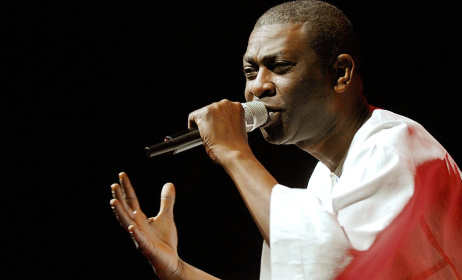COVID-19 and mental health in the music industry
The impact of the various coronavirus travel and crowd restrictions has hit hard music professionals whose livelihoods depend on live performances. This follows the cancellations of music events around the world in an attempt by governments to curb the spread of the virus. Much ink has been spilled on the economic impact of the global pandemic but little has gone into the potential mental health issues that could arise for music professionals.
 Thandiswa Mazwai is among the many South African artists who have voiced opinions on social media.
Thandiswa Mazwai is among the many South African artists who have voiced opinions on social media.
According to the South African Depression and Anxiety Group, about one in three people suffer, or will suffer, from a mental illness at some point in their lifetime. More than 73% of independent music makers experienced symptoms of mental illness, anxiety and depression, according to a 2019 study. These were also the most commonly experienced negative emotions in relation to music creation. With most performers’ income expected to take a knock due to tour cancellations, levels of anxiety and depression may rise. This, in combination with social distancing and being isolated at home during quarantine periods could lead to heightened stress levels for musicians and all those who ply their trade in public.
Through the use of various credible sources, we look at the mental health issues that could arise from the effects of the global pandemic, as well as some of the methods music professionals can employ to deal with them.
Financial stress increases mental health issues
Studies have shown that people who are in debt have higher rates of mental health issues, particularly depression and anxiety. Expert and development strategist for social justice organisation Masikhule Innovations Mthetho Tshemese says musicians who find themselves financially strained could develop mental complications. "They are likely to experience high levels of anxiety and may struggle with the adjustment of dealing with the massive uncertainty," he says. "Live performances contribute to the day-to-day running of musicians' lives. I saw Thandiswa Mazwai’s tweet where she breaks down the negative impact caused by the coronavirus. It remains to be seen what the duration of the impact is going to be.”
Celebrities are even more vulnerable
There is also evidence that social perceptions contribute to financial stress, where individuals with a higher perceived social standing tend to exhibit a stronger relation between negative financial events and mental stress. This could mean that musicians who command a higher social status may be more likely to develop a mental health complication.
Social isolation may lead to more problems
Evidence suggests that social isolation contributes to poor health and reduces the immune system’s ability to fight off diseases. Social isolation is also linked to health issues such as high blood pressure and cardiovascular disease, and vulnerability to infection.
Isolation in itself is said to make stressful situations harder to deal with, which means musicians who are isolated may find it harder to deal with pre-existing mental challenges.
There is also a level of paranoia that comes with occurrences like a pandemic. We’re already seeing paranoia playing out with recent cases of panic buying. This fear can be attributed in part to excessively overthinking a situation. UK-based counselling psychologist Dr Lucy Atcheson says one of the most dangerous things for your mental health is having too much time to think about your life critically. “When self-isolating you’ve got a lot of time to think and it’s very common to experience massive life dissatisfaction as a result," she says.
Substance abuse
The culture of self-medication and substance abuse in the music industry could also pose a challenge for musicians. Some artists may turn to alcohol and drugs as a coping mechanism for financial stress and social isolation, which could result in further mental health problems. The Centers for Disease Control and Prevention in the US has published this page that individuals can use as a general guide to manage stress and anxiety. There is also additional reading at the bottom of the page.
Preventions
Monitor the changes
According to Tshemese it is important that individuals pay attention to changes that may point to mental health issues. These could include fits of anger, malaise, a prolonged sense of cynicism, weight loss, neglect of hygiene and an unwillingness to communicate with others over the phone or online, among others.
"People need to monitor their general emotional energy," Tshemese says. "Things like how they feel in the morning, their sleeping patterns, and general sense of hope."
Don’t get drawn into a negative spiral
South African music therapist Diane Maris says musicians should turn a negative situation into a positive one and concentrate on the work they usually do not have the time for.
"Reframe your mind from 'I can’t perform' to 'I can finally write and record that song'," she says. "Approaching this time with feelings of being trapped will aggravate your stress levels. Instead, use the time as a chance to focus on yourself. Be aware of what is anxiety and what is reality in your thoughts and conversations. It’s about keeping equilibrium and distinguishing between the perspectives. Music can also be used in a therapeutic form that counteracts the anxiety due to all the hype from the pandemic."
Stay healthy and boost your immune system (with music)
Eat a healthy, well-balanced diet and avoid alcohol and drugs. Also remember to stay active by exercising, stretching and meditating during this time of restricted movement. The human body is not designed to stay in confined spaces. Listening to music can also improve your body's defence system. This is according to psychologists who believe that listening to upbeat music can boost immune functionality.
Maintain a daily routine
Try to maintain some of your normal daily structure from the pre-quarantine days, such as waking up and going to bed around the same time, and eating meals as you would normally. Try not to watch too much TV late into the night to avoid flipping your day and night around. Evidence suggests that humans are designed to sleep at night. Doing all-nighters is not only dangerous for your mental health but also for your physical well-being.
Limit news intake
With the freeing of time from social obligations, people may be inclined to obsess by over-researching the pandemic. Reduce your intake by limiting the amount of news content you watch, read or listen to. If you do want to be up to date with what is happening with the coronavirus pandemic around the world, make sure you consume credible media and sources. Misinformation and fake news could easily intensify levels of stress and anxiety.
Online support and phone counselling services
Tshemese says people should explore online musicians' community groups and phone counselling services as an option to talk to a professional if depression and anxiety become unmanageable.
"Musicians can form healing circles wherein they create a safe online space to support each other emotionally,” he says.
He also urges musicians to contact the South African Depression and Anxiety Group, which has free telephonic counselling services. "They also have a network of psychologists, social workers and other mental health professionals to whom they refer. Government departments such as Social Development, Health and Education have mental health services that can also assist any artists experiencing changes in mental behaviour."
Maris said: "It's also important to stay in touch with your friends and family. Have conversations about your feelings with people you trust. Artists can also help other people identify their own emotional stress through music and online engagement."
It is highly recommended to seek professional assistance when you think you may be experiencing mental health challenges. In South Africa you may call the South African Depression and Anxiety Group to speak to a counsellor between 8am and 8pm on Monday to Sunday on 011 234 4837. You can also contact Diane Maris for consultation on 082 926 0548.
























Commentaires
s'identifier or register to post comments